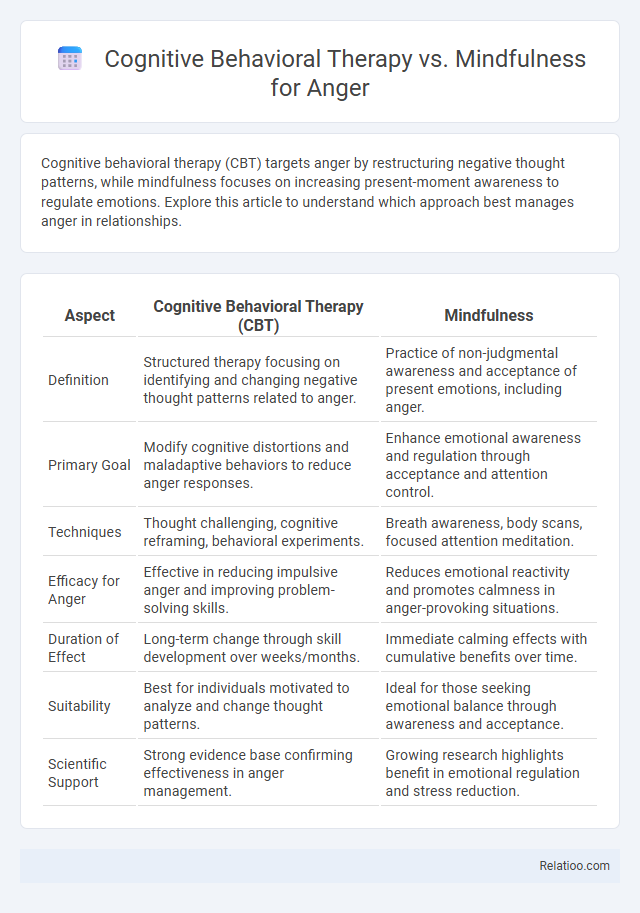Cognitive behavioral therapy (CBT) targets anger by restructuring negative thought patterns, while mindfulness focuses on increasing present-moment awareness to regulate emotions. Explore this article to understand which approach best manages anger in relationships.
Table of Comparison
| Aspect | Cognitive Behavioral Therapy (CBT) | Mindfulness |
|---|---|---|
| Definition | Structured therapy focusing on identifying and changing negative thought patterns related to anger. | Practice of non-judgmental awareness and acceptance of present emotions, including anger. |
| Primary Goal | Modify cognitive distortions and maladaptive behaviors to reduce anger responses. | Enhance emotional awareness and regulation through acceptance and attention control. |
| Techniques | Thought challenging, cognitive reframing, behavioral experiments. | Breath awareness, body scans, focused attention meditation. |
| Efficacy for Anger | Effective in reducing impulsive anger and improving problem-solving skills. | Reduces emotional reactivity and promotes calmness in anger-provoking situations. |
| Duration of Effect | Long-term change through skill development over weeks/months. | Immediate calming effects with cumulative benefits over time. |
| Suitability | Best for individuals motivated to analyze and change thought patterns. | Ideal for those seeking emotional balance through awareness and acceptance. |
| Scientific Support | Strong evidence base confirming effectiveness in anger management. | Growing research highlights benefit in emotional regulation and stress reduction. |
Understanding Anger: Causes and Impact
Cognitive behavioral therapy (CBT) targets the underlying thought patterns that fuel anger, helping You recognize triggers and reframe negative beliefs to manage emotional responses. Mindfulness focuses on enhancing awareness of present emotions and physiological sensations, allowing You to observe anger without immediate reaction and reduce impulsivity. Understanding anger's causes, such as stress, frustration, or unmet needs, and its impact on relationships and health, forms the foundation for effective anger management strategies using both CBT and mindfulness.
Overview of Cognitive Behavioral Therapy (CBT)
Cognitive Behavioral Therapy (CBT) targets the underlying thought patterns that fuel anger, helping individuals recognize and reframe negative beliefs to reduce emotional intensity. This approach contrasts with mindfulness, which emphasizes present-moment awareness and acceptance of anger without judgment. Understanding CBT's structured techniques allows your anger management strategies to become more proactive and effective in preventing outbursts.
Key Principles of Mindfulness Practices
Mindfulness practices in anger management emphasize present-moment awareness and non-judgmental acceptance of thoughts and emotions, which helps reduce impulsive reactions by fostering emotional regulation. Cognitive Behavioral Therapy (CBT) targets anger by identifying and reshaping distorted thought patterns that trigger anger, promoting problem-solving and adaptive behavior changes. Combining mindfulness with CBT principles enhances anger management by integrating self-awareness with cognitive restructuring for lasting behavioral improvements.
How CBT Addresses Anger Management
Cognitive Behavioral Therapy (CBT) addresses anger management by identifying and challenging irrational thoughts that fuel anger, promoting healthier emotional responses and coping strategies. Unlike mindfulness, which focuses on present-moment awareness and acceptance, CBT systematically modifies thought patterns to prevent anger escalation and improve decision-making. Evidence shows CBT effectively reduces aggressive behavior by restructuring cognitive processes and enhancing problem-solving skills.
Mindfulness Techniques for Reducing Anger
Mindfulness techniques for reducing anger emphasize present-moment awareness and non-judgmental acceptance, enabling individuals to recognize anger triggers early and respond calmly. Unlike traditional cognitive behavioral therapy, which targets changing thought patterns and behaviors, mindfulness fosters emotional regulation through meditation, breathing exercises, and body awareness. Integrating mindfulness into anger management enhances self-control and decreases reactivity, providing effective tools to manage intense emotions.
Effectiveness of CBT vs Mindfulness for Anger
Cognitive Behavioral Therapy (CBT) demonstrates higher effectiveness in treating anger by targeting irrational thoughts and promoting adaptive behaviors through structured interventions. Mindfulness-based approaches emphasize present-moment awareness and emotional regulation, which reduce anger intensity but may require longer practice to yield significant outcomes. Comparative studies show CBT produces faster, more measurable reductions in anger episodes, while mindfulness offers sustained benefits in emotional resilience and stress reduction.
Personalization: Choosing the Right Approach
Cognitive behavioral therapy (CBT) targets anger by identifying and restructuring distorted thought patterns, making it effective for individuals needing practical strategies to control impulsive reactions. Mindfulness emphasizes present-moment awareness and emotional regulation, benefiting those who struggle with recognizing and accepting their anger without immediate judgment. Personalized anger management plans often combine CBT techniques and mindfulness practices based on a person's unique triggers, coping style, and therapy goals to optimize outcomes.
Integrating CBT and Mindfulness for Anger Control
Integrating Cognitive Behavioral Therapy (CBT) and Mindfulness techniques enhances anger management by addressing both thought patterns and emotional regulation. CBT targets distorted beliefs and develops coping strategies, while Mindfulness fosters present-moment awareness and reduces reactive responses. Combining these approaches leads to improved anger control through increased self-awareness and adaptive behavioral changes.
Scientific Evidence and Research Findings
Cognitive behavioral therapy (CBT) demonstrates robust scientific evidence in reducing anger by targeting maladaptive thought patterns and promoting behavioral change, with meta-analyses confirming its efficacy in anger management interventions. Mindfulness-based approaches, supported by neuroimaging studies, enhance emotional regulation and decrease physiological arousal associated with anger but often serve as complementary strategies rather than standalone treatments. Comparative research indicates that integrating CBT with mindfulness techniques yields superior outcomes in anger reduction compared to either method alone, highlighting the importance of combined therapeutic frameworks in evidence-based anger management.
Practical Tips for Managing Anger Daily
Cognitive Behavioral Therapy (CBT) targets anger by helping you identify and change negative thought patterns, while Mindfulness encourages awareness and acceptance of your emotions to reduce impulsive reactions. Practical tips for managing anger daily include deep breathing exercises, keeping a journal to track triggers, and practicing mindful meditation to increase emotional regulation. Consistent application of these strategies can improve your ability to respond calmly and effectively in stressful situations.

Infographic: Cognitive behavioral therapy vs Mindfulness for anger
 relatioo.com
relatioo.com